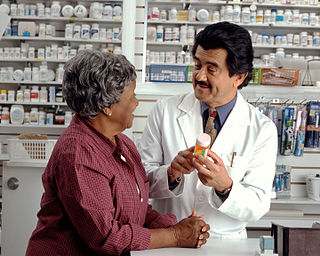Charles B Macgibbon played an important role in developing the hospital pharmacy profession in Australia. He was the Chief Pharmacist at the Royal Melbourne Hospital from 1938. [1] At this time there were only 36 hospital pharmacists in the Victorian hospital system and there was virtually no collaboration between them. Charles realised that by joining together, hospital pharmacists in Victoria could strengthen the profession and contribute to better quality pharmacy services. Charles and Fred J. Boyd actively worked to create a society for hospital pharmacists. In 1941 he became the founding president of the Society of Hospital Pharmaceutical Chemists [2] (Victorian Division) which was the forerunner to The Society of Hospital Pharmacists of Australia. During Charles' time as president of the Society, he advocated strongly to ensure hospital appointed pharmacists and that patients had access to safe medicines.

The Royal Melbourne Hospital (RMH), located in Parkville, Victoria, an inner suburb of Melbourne, is one of Australia’s leading public hospitals. It is a major teaching hospital for tertiary health care with a reputation in clinical research. The hospital is managed as part of Melbourne Health which comprises the Royal Melbourne Hospital, North West Dialysis Service and North Western Mental Health. The Melbourne Health Chief Executive is Christine Kilpatrick.
Fred J. Boyd was an Australian pharmacist, qualified accountant and Radiographer, and the founding president of The Society of Hospital Pharmacists of Australia.
The Society of Hospital Pharmacists of Australia (SHPA) is a professional association. Membership mostly comprises hospital pharmacists, but is open to pharmacy technicians and pharmacy students. The organisation aims to support and provide professional development to its members and be an advocate for improved medicines management in policy and practice. The society also produces various publications, including the Journal of Pharmacy Practice and Research (JPPR).
During World War II, Charles was appointed hospital representative of the Australian War Pharmacopoeia. The Australian War Pharmacopoeia was produced because of a need to find new ways to produce old drugs during war rationing. [3] It was also produced after the Australian Health Minister was frustrated with waiting for the British Medical Association to create one. [4] An extract from the pharmacopoeia explains: 'The present War has caused irregularities in the supply of certain drugs and difficulties now experienced in obtaining branded articles may increase. This publication was therefore produced... to help physicians by suggesting alternatives when a substance commonly prescribed by him is temporarily unobtainable.' In 1950 he successfully fought on behalf of hospital pharmacists for the right for patients to have access to the Pharmaceutical Benefits Scheme as both inpatients and outpatients of hospitals. [5] In 1963 he was the second recipient of the Evans Medal for Merit for his work to progress professionalism of hospital pharmacists over many years. [6]

World War II, also known as the Second World War, was a global war that lasted from 1939 to 1945. The vast majority of the world's countries—including all the great powers—eventually formed two opposing military alliances: the Allies and the Axis. A state of total war emerged, directly involving more than 100 million people from over 30 countries. The major participants threw their entire economic, industrial, and scientific capabilities behind the war effort, blurring the distinction between civilian and military resources. World War II was the deadliest conflict in human history, marked by 50 to 85 million fatalities, most of whom were civilians in the Soviet Union and China. It included massacres, the genocide of the Holocaust, strategic bombing, premeditated death from starvation and disease, and the only use of nuclear weapons in war.
The British Medical Association (BMA) is the professional association and registered trade union for doctors in the United Kingdom. The association does not regulate or certify doctors, a responsibility which lies with the General Medical Council. The association's headquarters are located in BMA House, Tavistock Square, London. Additionally, the association has national offices in Cardiff, Belfast, and Edinburgh, a European office in Brussels and a number of offices in English regions. The BMA has a range of representative and scientific committees and is recognised by National Health Service (NHS) employers as sole contract negotiators for doctors.
The Pharmaceutical Benefits Scheme (PBS) is a program of the Australian Government that provides subsidised prescription drugs to residents of Australia, as well as certain foreign visitors covered by a Reciprocal Health Care Agreement. The PBS seeks to ensure that Australian residents have affordable and reliable access to a wide range of necessary medicines. The PBS has faced increased scrutiny as its cost has increased. The scheme assumes responsibility for the cost of drugs to patients in the community setting rather than while in hospital which is the responsibility of each state and territory. Together with Medicare the PBS is a key component of health care in Australia.









